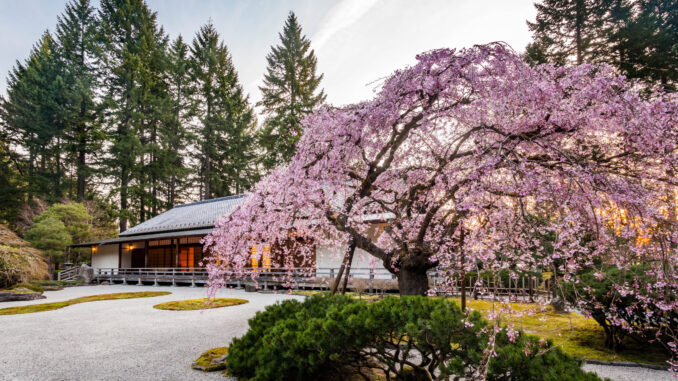
BY JOSH NARISMA
Nearly 80 years after the Japanese attack on Pearl Harbor, which resulted in approximately 112,000 Japanese-Americans being forced into internment camps along the West Coast, the Japan Society celebrated the United Nations International Day of Peace by inviting various diplomatic groups to the New York Peace Symposium.
Although the event was partially organized by the Portland Japanese Garden in Oregon (one of the largest such gardens in America), the symposium was held in New York City, which boasts the fourth largest Japanese population in the United States. New York has its own Japanese garden at the Brooklyn Botanic Garden, designed by Takeo Shiota. It once held a replica of the Ryoanji temple’s sand-and-stone garden in Kyoto, which was overseen by designer Takuma Tono.
Tono is the same designer who was commissioned to create the Portland Japanese Garden in the early 1960s. Portland garden CEO Steve Bloom opened the Peace Symposium by remarking that the garden was met with resistance when constructed in the 1960s. “Kinya Hiro, the first Garden Director from 1964-69, encountered mobs chanting racial slurs, with one man even yelling ‘you killed my father!’” he said. At one point, “Hiro was even hospitalized after attempting to stop people from vandalizing the garden […] He vowed to never return to the United States.”
Despite Portland being named a sister city to Sapporo in 1959, the garden was seen as a bitter reminder of World War II, which left racial tensions high across the US. According to the Oregon Historical Society, thousands of Japanese-Americans in Portland were sent to an Assembly Center which contained houses made of thin plywood and single light bulbs, where “the smell of manure was overwhelming.” Most of them were later forced to Minidoka, Idaho, where the camps had “deplorable living conditions” that offered no privacy and led to food poisoning and illness.
Bloom declared that the Portland Japanese Garden remains an important site of cross-cultural advocacy in Portland, which is “one of the most predominantly White major cities in America.” Bloom recalls that it took “a lot of convincing,” but they managed to invite Hiro back to inaugurate the Garden’s $33-million expansion in 2017.
Hiro later wrote in a letter to the Garden: “This Garden is a reminder of peace and reconciliation. A symbol that the City of Portland has the heart to forgive and accept foreign cultures. These are the virtues that this great nation was built upon.”
The symposium gathered community leaders, foreign diplomats, and renowned artists to address healing Japanese-American relations and the role of art and culture in global peacemaking. Co-presented between the Portland Japanese Garden, Japan Institute, and Japan Society, it is the third in a series of cross-continental Peace Symposia: Tokyo (September 2022), London (December 2022), New York (September 2023), South Africa (December 2023), São Paulo (2024), and Sydney (2024).
The symposium’s keynote address was delivered by Caryl Stern, Former CEO of UNICEF USA. Stern’s mother was given by her parents to someone else in order to flee Europe during the Holocaust: “It wasn’t until years later that their family was reunited […] I am alive today because of the kindness of a stranger.” Stern highlighted the significance of international partnerships and recounted how she helped New York distribute aid to Haiti during the 2010 earthquake.
“Red Campion” by Mayah Pico
I’m not
sitting cross-legged in the centre
of the woven rug
in my socks anymore
I’m now
sprawled out limb-to-limb
in the centre
of the wildflower field
bare feet
poking out above a tapestry of pink
Asking the angels if they can see me clearly
Stern’s address was followed by readings from commissioned poet Nomi Stone, and winners of the 2023 Poetry for Peace Competition USA: Mayah Pico, Hana Widerman, and Yvanna Vien Tica. The symposium concluded with a moderated panel discussion on interdisciplinary methods of conflict resolution, and a presentation on art as peacemaking by Japanese artist Hiroshi Senju, whose work appears in the Metropolitan Museum of Art and the Brooklyn Museum, among others.
Steve Bloom expressed an interest in re-inviting the poets from every symposia to Portland: “It’s years away, but we’d love to have every poet come read again at the Garden and compile their works into a book.”
Bloom is already preparing for the next leg of the tour, which picks up again in three months in South Africa.
